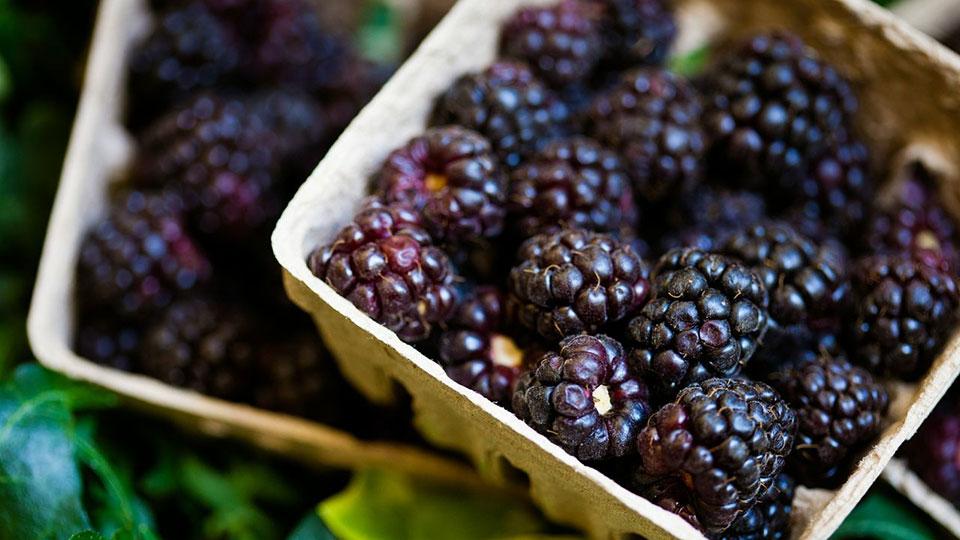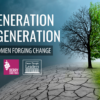On March 8, 2020, Berry Good Food held its ninth Future Thought Leaders panel discussion, “High Hopes: Navigating the Crossroads,” and invited eight experts to discuss the increasing use of hemp both as an agricultural crop and as a medical and recreational tool through its applications as THC and CBD.
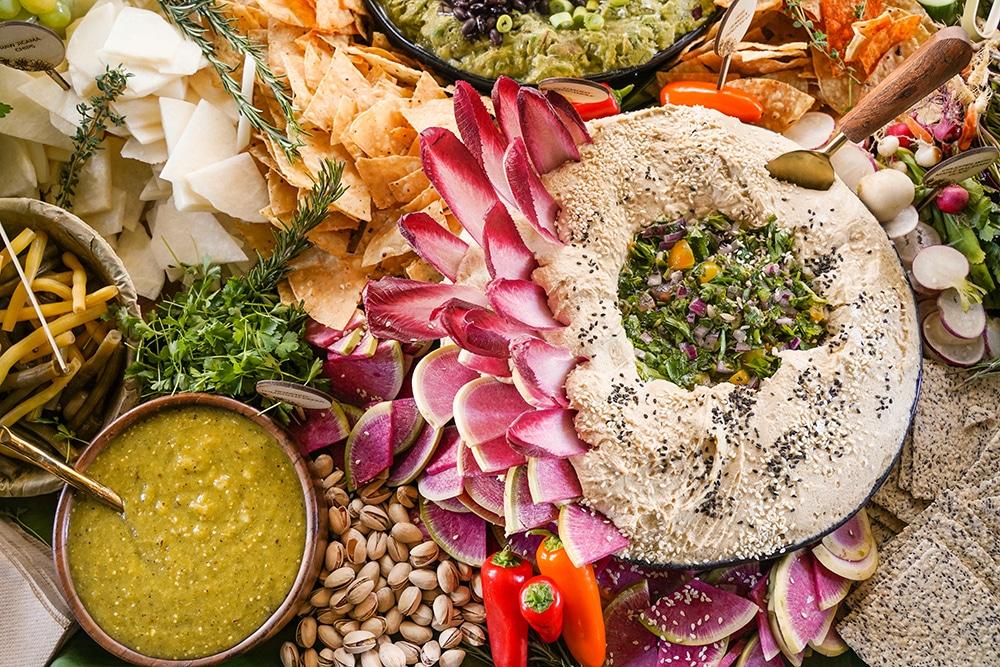
A beautiful and delicious vegan buffet awaited “High Hopes” guests, courtesy of Perla’s Elevation Eating (Photo: Melissa Jacobs)
More than 250 people gathered at the University of California San Diego, enjoyed a bountiful vegan buffet from Perla’s Elevation Eating, and listened to a wide-ranging discussion that included challenges faced by farmers entering the hemp market, overcoming societal stigma for patients and doctors, addressing legalization and the injustice for millions who are currently imprisoned for cannabis-related offenses, emerging medical treatments for conditions like PTSD, the importance of third-party analysis, and more.
To get us started on defining our terms, Dr. Erica Oberg of Halcyon Botanics explained that hemp and cannabis (marijuana) both derive from the cannabis sativa plant, but cannabis contains more than 0.3 percent THC (tetrahydrocannabinol), or the psychoactive element associated with marijuana, and is therefore regulated and sold in licensed dispensaries in California and some other states. Hemp is selected and hybridized for fiber and fabric, for edible items like hemp seeds, and for its high levels of CBD (cannibidoil), which does not have the psychoactive component but can be effective for pain relief, treating anxiety, and more.
Yet these definitions are just the tip of the iceberg. “Cannabis sativa is like the rainforest of plants,” explained Erik Cutter of Alegría Fresh. “Hemp and cannabis have over 500 active compounds in them, well over 150 cannabinoids, and we talk about 2 of them: CBD and THC.”
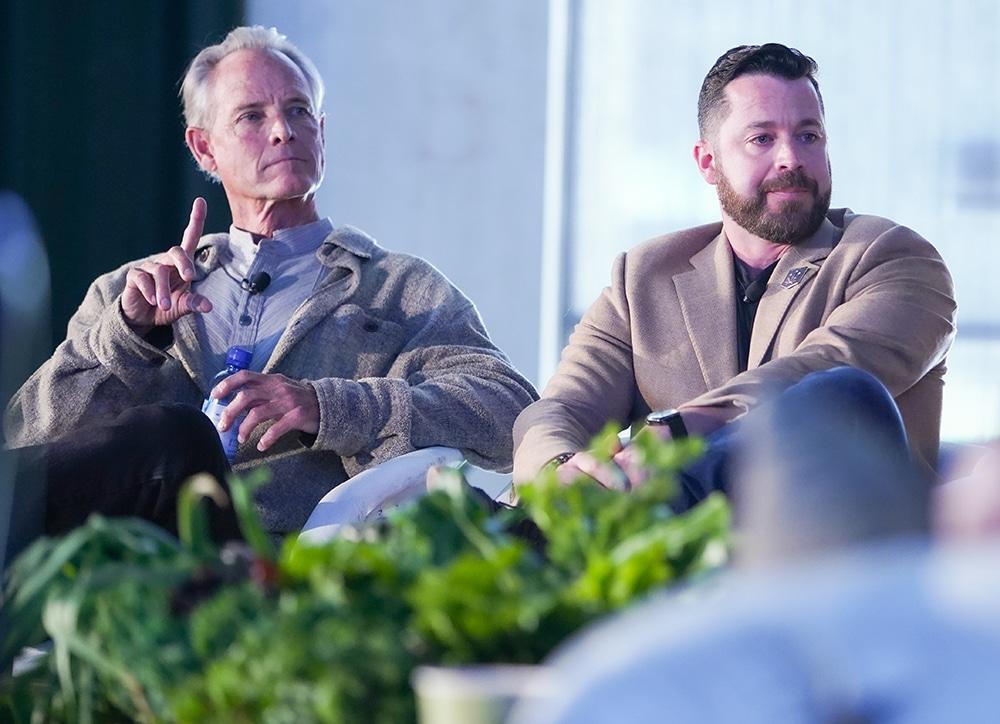
Panelists Erik Cutter (left) and Bryan Buckley (photo: Melissa Jacobs)
Cutter, whose work focuses on toxin-free soil that produces clean cannabis, went on to warn that hemp is a bioaccumulator, which means it accumulates whatever contaminants are in the soil faster than it can excrete them. “If your cannabis hasn’t been third party lab tested, do not touch it,” said Cutter. “If you smoke a joint that’s loaded with any pesticides at all, you just drove them right into your brain. They didn’t go through your GI tract, there’s no breakdown, no digestion. You just wiped your brain out.”
Dr. Douglas “Duffy” Mackay of CV Sciences Inc., whose company develops synthetic and botanical CBD products for pharmaceutical and recreational uses, noted the challenge for farmers transitioning into the emerging hemp market. “The most challenging thing for hemp farmers right now is if it gets too warm or you give the plants too much nutrition,” says Mackay, “the THC levels will rise above 0.3 percent, so one day farmers have an agricultural commodity and the next day they could have a controlled substance.”
Bryan Buckley, a former Special Operations Team Commander in the U.S. Marine Corps, started researching the benefits of cannabis for veterans suffering from PTSD, as THC is very well suited for treating its symptoms versus more destructive self-medication tools like alcohol and opioids. Due to stigma, however, Congress needs extensive data to make any sweeping change to legislation, so as CEO of Helmand Valley Growers Co. Buckley is carrying out patient studies with the goal of bringing a medical cannabis treatment to the entire Veterans Affairs network.

Rachel King (left) and Jackie Bryant (Photo: Melissa Jacobs)
Journalist Jackie Bryant chimed in about the urgent need to remove stigma and repeal the criminalization of cannabis. “Recreational legalization paves the way for human rights and social justice initiatives,” said Bryant. “It is not until cannabis is recreationally legal that we can address the fact that we have millions of Americans in jail for cannabis-related offenses.”
Many panelists reinforced the message that the use of cannabis is highly individualized depending on one’s biology, much like a cup of coffee can make one person very jittery while another feels fine. Patients can easily choose the wrong treatment by having to navigate through thousands of products without proper guidance. Seeking advice from a dispensary like Columbia Care in Pacific Beach, which is part of a larger patient-centered organization that works with hospitals around the world, or choosing high-quality edibles from Kaneh Co., whose doses are highly regulated, and are a discreet way for many patients to find relief, are reliable places to start.
Dr. Mark Kalina of Pacific Pearl La Jolla endorses the beneficial pain-relieving effects of THC and CBD for his patients undergoing cancer and other medical conditions, citing conventional treatment drugs as suboptimal. “It’s a spiritual plant and we need to give it respect. Marijuana is safe, and it’s a big part of the future of health and well-being, but it needs to be done with the right spirit in the right time in the right place with the right people. It’s a better world now.”
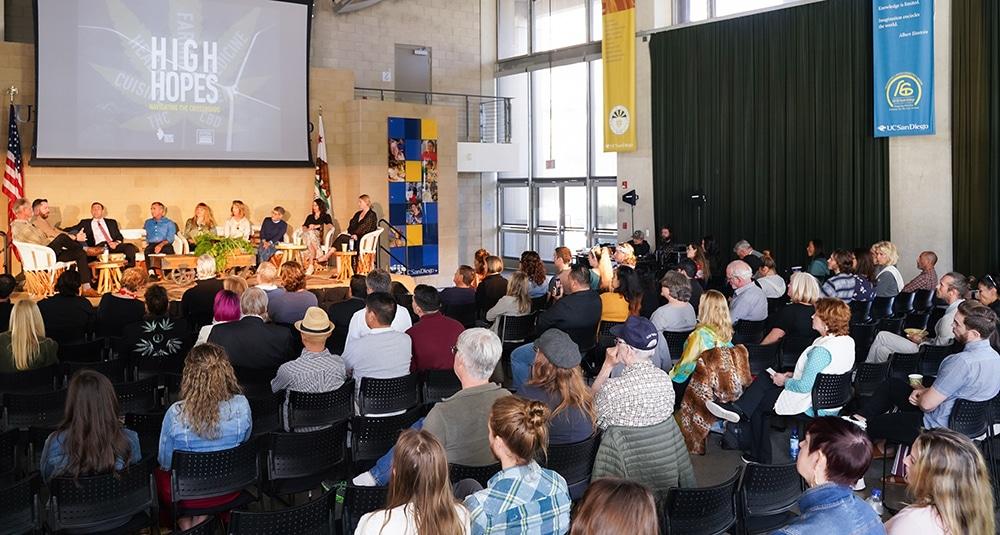
(Photo: Melissa Jacobs)
Panel High Points
By Jennifer Curran
HEMP AND CBD COMPRISE A HUGE MARKET U.S. sales of hemp-based products are more than $600 million annually and growing.
IT IS A LEGISLATIVE AND REGULATORY MINEFIELD U.S. state laws differ with respect to the sale and use of marijuana, whether it’s for medical use, decriminalization, or full legalization.
RESEARCH IS LIMITED BUT MEDICAL BENEFITS LOOK PROMISING CBD, THC and other cannabinoids may be effective for treating pain, nausea, anxiety and inflammation. Helmand Valley Growers is running trials with veterans to assess the efficacy of THC in the treatment of PTSD.
LEGALIZATION PROVIDES A FIRST STEP TO SOCIAL JUSTICE Recreational legalization is key to providing social justice for many who remain incarcerated for possession of marijuana.
REMOVING THE STIGMA OF MARIJUANA IS ESSENTIAL TO REALIZING ITS MEDICAL BENEFITS Stigma prevents doctors from embracing CBD and THC as methods of legitimate medical treatment for patients.
KNOW WHAT YOU ARE INGESTING Only use hemp or marijuana derived products that have been 3rd party lab-tested and get a certificate of analysis.
GET EXPERT ADVICE FOR MEDICAL USE If you want to explore treatment for a medical condition, see a doctor who is experienced in the use of medical marijuana or go to a respected medical dispensary, as opposed to a recreational dispensary.
THERE ARE RISKS Smoking marijuana is not likely associated with lung cancer; however, it does cause irritation and chronic coughing. THC use is thought to be more dangerous for people under 25 and has been associated with psychosis in young people with bipolar disorder. Legalization can protect against some risks.
LEARN MORE
Project CBD
CBD Oil Review
US National Library of Medicine

Thank you to our panelists! From L to R: Bryan Buckley, Jackie Bryant, Dr. Douglas Mackay, Dr. Mark Kalina, Michelle Ciccarelli Lerach, Dr. Erica Oberg, Carolyn Kates, Erik Cutter, Rachel King (Photo: Melissa Jacobs)
“High Hopes” panelists:
- Jackie Bryant: Freelance journalist
- Bryan Buckley: CEO and Co-Founder, Helmand Valley Growers Co.
- Erik Cutter: Managing Director, Alegría Fresh
- Carolyn Kates: Columbia Care
- Dr. Mark Kalina: Pacific Pearl La Jolla
- Rachel King: Founder, Kaneh Co.
- Dr. Douglas “Duffy” Mackay: Senior Vice President of Scientific and Regulatory Affairs, CV Sciences Inc.
- Dr. Erica Oberg: Halcyon Botanics
- Michelle Ciccarelli Lerach: Moderator and Founder of Berry Good Food
We want to express our sincere gratitude to panel sponsors Haeggquist & Eck LLC and Columbia Care.
Catch up on all of our Future Thought Leaders panel discussions here.
